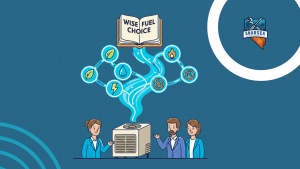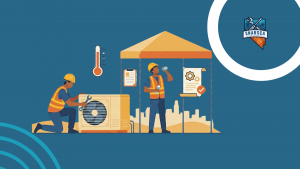An HVAC technician’s job is to install, maintain, and repair the systems that control the climate in our homes and businesses. As technology evolves and energy efficiency becomes more important, the skills required for this job are becoming more complex. While it’s possible to enter the field through a certificate program or an apprenticeship, many aspiring technicians are choosing to earn an HVAC associate degree. This degree provides a deeper understanding of the trade and opens up more opportunities.
What an HVAC Associate Degree Covers: Courses and Skills
An hvac associate’s degree program typically takes two years to complete and provides a comprehensive education that combines hands-on technical training with a solid academic foundation. Unlike a shorter certificate program that focuses on basic skills, an associate degree prepares students for the full range of challenges they’ll face on the job.
Typical Courses Include:
- HVACR Fundamentals: An introduction to the principles of heating, ventilation, air conditioning, and refrigeration. Students learn about the thermodynamic laws that govern how these systems work, as well as the different types of equipment used in residential and commercial settings.
- Electrical Systems: A crucial part of any HVAC education, students learn to read blueprints, understand electrical schematics, and safely work with wiring, motors, and controls. This knowledge is essential, as many HVAC problems are electrical in nature.
- Refrigeration and Refrigerants: In-depth knowledge of different refrigerants, the refrigeration cycle, and how to safely handle and recover them. This is particularly important in today’s environment, with the ongoing phase-out of certain refrigerants.
- Heating Systems: Understanding various heating methods, including furnaces, boilers, heat pumps, and radiant heating. Students learn to troubleshoot and repair different fuel sources, from natural gas to electricity.
- Ductwork and Airflow: Principles of air distribution, duct design, and how to ensure proper airflow for maximum efficiency. Improper airflow can lead to system breakdowns and higher energy bills, so this skill is vital.
- Advanced Topics: Many programs include courses on building automation, energy management, and sustainable technologies, preparing students for the future of the industry. This is where the associate degree truly sets itself apart, giving graduates an edge in a rapidly changing field.
In addition to technical classes, an associate degree program may include general education courses in math, physics, and communication, which help graduates develop critical thinking and problem-solving skills.
Career Paths: What Can You Do with an Associate’s Degree in HVAC?
An associate degree in HVAC doesn’t just prepare you to be a technician; it can be a stepping stone to a wide variety of career opportunities. While many graduates start as entry-level technicians, the degree gives them a significant advantage and can help them advance more quickly.
Common Career Paths:
- HVAC Technician: The most common path, involving installing, maintaining, and repairing residential and commercial systems. An associate degree graduate is often seen as more knowledgeable and may be given more complex tasks and responsibilities from the start.
- HVAC Installer: Specializing in the installation of new systems, often working on new construction or major system replacements. The technical knowledge from the degree is invaluable for ensuring a perfect installation.
- Service Manager: After gaining some field experience, a technician with an associate degree is well-positioned to move into a management role. This involves supervising a team of technicians, managing schedules, and overseeing client relationships.
- Estimator or Project Manager: With a deeper understanding of systems and a more developed skill set, a graduate can work in an office role, estimating costs for new projects or managing large-scale installations from start to finish.
- HVAC Sales Engineer: Combining technical knowledge with sales skills to sell complex HVAC systems to commercial clients. The degree provides the credibility and expertise needed to sell high-value equipment.
- Inspector or Educator: Some graduates use their experience and degree to become building inspectors or instructors at a trade school, passing their knowledge on to the next generation of technicians.
The Financial Benefits: Associate Degree in HVAC Salary
While salary depends on factors like location, experience, and the specific company, earning an hvac technician salary with associate degree is often higher than the salary of a technician with only a certificate or apprenticeship.
- Higher Starting Pay: Employers often recognize the value of an associate degree and are willing to offer a higher starting wage to graduates who have a more comprehensive skill set. This can be a significant boost to your income right from the start of your career also they can partner themselves with any HVAC association for better career growth.
- Faster Advancement: The degree provides the foundational knowledge needed for leadership roles. This means that a graduate can often move into positions like service manager or project manager sooner, which come with a significant pay increase.
- Increased Earning Potential: Over a career, the added knowledge from an associate degree can lead to a higher overall salary. It gives technicians the skills to work on more complex and specialized systems, which often command a higher price and lead to better pay.
Summary: The Big Picture
Choosing to pursue an HVAC associate degree is a strategic decision for those who want to build a long-term, successful career in the HVAC industry. The program provides a broad education that goes beyond basic technical skills, preparing graduates to adapt to new technologies and take on leadership roles. With higher earning potential and more career options, the investment in a degree can pay off for years to come.


